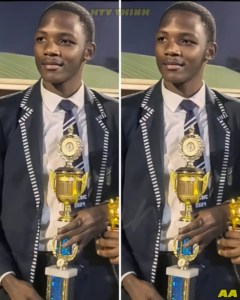A South African matriculant who achieved an exceptional six distinctions in her final exams is now grappling with the harsh reality of being rejected by multiple universities.

Despite her stellar academic performance, the student found herself without a place at any of the universities she applied to.
Her story quickly gained widespread attention on social media, as people were shocked to learn that someone who had worked so hard and earned such impressive results could still face rejection.
“Reality hits hard,” she wrote in a social media post, expressing her deep frustration and disbelief at the rejection letters that had arrived.
The student’s situation has struck a chord with many South Africans who understand the pressures and challenges of trying to secure a spot at a university in the country.
In South Africa, university admission is extremely competitive, and the demand for higher education far exceeds the number of available spots.
While the country’s universities are home to thousands of students, the number of matriculants applying each year continues to rise, leaving many academically accomplished young people without a chance to continue their studies.
This matriculant’s rejection highlights a major issue with the country’s education system, where only a limited number of students can access tertiary education despite their hard work and dedication.
The experience of this student is not unique; many others in South Africa have faced similar difficulties in securing a place at university, despite having achieved top marks in their exams.
This has led to growing frustration, with many questioning the fairness of the admission process and the lack of capacity at universities to accommodate all deserving students.
The country’s educational system is plagued by overcrowded universities, limited resources, and high competition, which often leave students with no options after completing their schooling.
As a result, this student’s story has ignited a broader conversation about the future of education in South Africa and how to ensure that all matriculants, regardless of their circumstances, have access to higher education opportunities.
For many, the question remains: how can a system that rewards academic excellence fail to provide a fair pathway for those who have earned it?
The student’s rejection has highlighted the inequality in access to education, with many talented students being left behind because the system simply cannot accommodate them.
While some students may find alternative pathways into education, such as vocational training or online courses, for many others, university is the only option for pursuing their chosen careers.
The growing concerns around the education system have led to calls for reform, with many advocating for more investment in universities to expand their intake capacity and better meet the needs of South Africa’s youth.
Some have suggested that the government should focus on creating more accessible and diverse routes to higher education, so that no student is left without an opportunity simply because of overcrowding in traditional universities.
This situation also underscores the need for more support and resources for students who excel academically but are unable to secure university placements.
There have been calls for universities to re-evaluate their admission processes and explore new ways to ensure that talented students are not excluded from higher education simply because of limited spots.
As the debate around this issue continues to grow, it is clear that changes must be made to ensure that South Africa’s education system is fair and inclusive for all students, regardless of their academic background or financial situation.
For the student at the center of this story, the path forward remains uncertain, but her experience has sparked an important conversation that could lead to real change in the future of South African education.
Her story serves as a powerful reminder that academic achievement should not be the only determining factor in gaining access to higher education and that the system needs to evolve to meet the demands of an ever-growing and talented youth population.
The hope is that, through continued advocacy and dialogue, South Africa’s education system will become more accessible and equitable, giving every student the opportunity to pursue their dreams and succeed.







